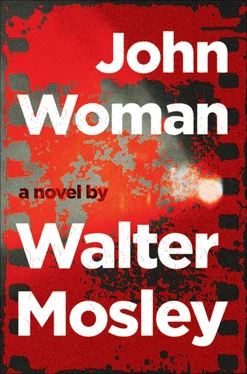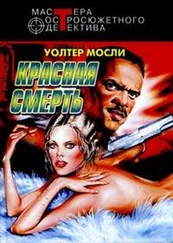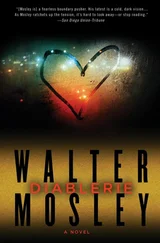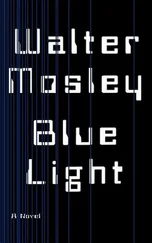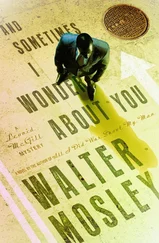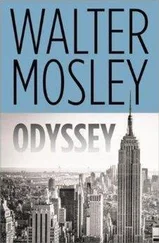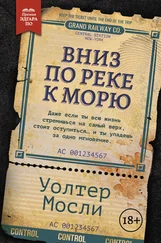“That is true, Cornelius. Ideas had begun to fade. It was hard for me to focus. At first I thought it was our long talks that brought me back to awareness. But there must have been some medicine or nutrient they gave me that rejuvenated my mind.” Upon saying this Herman went into a fit of coughing. It was a rolling, raspy, wet cough that went on and on.
“How are you feeling, dad?” Cornelius asked when his father lay back panting from the effort.
“Not too well. My hip aches and it makes me sweat just to lay here. But I have my mind.”
Cornelius pulled up a chair and touched his father’s hand.
“There is no hiding from it,” the elder Jones said. “You saved me from indignity but the grim reaper will not be denied.”
Herman’s lower eyelids sagged open as if some preternatural gravity was dragging him down.
“Do you want me to read to you, dad?”
“No. You have taken care of me all these years when it was my job to look out for you. You read to me and prepared thousands of dinners. I have failed you.”
“But, dad, you showed me Hannibal and the empire of Kush, the Shang Dynasty and the Inquisition. You taught me how to think.”
Herman Jones smiled at his son.
“Your mother and I failed you but you never disappointed us,” he said. “You have been a good son.”
“I love you, dad. I want you to live.”
“I have to sleep for a while, Cornelius. When I wake up I will do something for you. ”
He closed his eyes and was immediately asleep.
Cornelius sat there looking at Herman’s hands. They were old, intelligent hands that reminded the boy of a da Vinci drawing he had once seen in a book. The phone rang many times over the night. It went unanswered.
The night was cold. The steam heat for the building wasn’t yet turned on. The lights were out except for one bulb in the kitchen, two rooms away. This faint radiance filtered through the darkness of CC’s mind. It was like a far-off hope. He couldn’t tell then if it was fading away or beckoning a new day.
Just after eleven CC realized he hadn’t gone to work that night. Maybe the phone calls had been from France Bickman.
Around one a.m. he accepted that his father would soon die and that Lucia Napoli was gone for good; these thoughts made him shiver so he climbed under the covers with his father.
When he opened his eyes the room was filled with light. His head was nestled against his father’s side. Herman was looking down on him. Cornelius held his breath so as not to break the spell.
“Wake up, sleepyhead,” Herman said.
Cornelius was a child again with parents who showered love on him every morning.
“Hi, dad. I’m sorry about getting in your bed but it was cold and I didn’t want to leave you alone.”
“I was not going to die last night,” Herman Jones said. “I have a promise to keep.”
“What is it?”
“Not really one thing but three. Some knowledge, some advice and then another thing.”
“Can I go to the bathroom before you explain?”
“You may.”
He remembered that one urination the rest of his years: bare feet on the cracked tiles, corroded copper pipes poking out through the plaster behind the tank, the exultation of release, and the memory of physical closeness with his father. There was salsa music playing somewhere and the sharp smell of tomatoes cooking. A huge fly buzzed in between the screen and the window and there was a rumble in the ground, far away. The J train Cornelius thought and he laughed to himself, I’ve been too busy to notice it. When he got back to the bedroom Herman was wearing his reading glasses, turning the pages of a book.
“Hello, son,” he said in a full, strong voice. “Come sit and talk.”
Cornelius pulled up a chair.
“I promised I would do something and I mean to accomplish that end.”
“What’s that, dad?”
“First I will explain the remaining three pillars of historical inquiry, then I shall give you some personal advice, and sometime later, after I pass on, I will help you along on your journey.”
Cornelius was a child again.
“The pillars,” Herman explained, “are quite simple. The first, as I told you some time ago, is sex. We need not spend any more time on that subject. The next two mainstays are inextricably intertwined. These are technology and economics, both entities secretly conspiring to inform the relations of humans to their world. Lewis Mumford and Jacques Ellul speak to the phenomenon of technology and its bastard son — technique. Marx is as good an example as any of how economics rears its head in every room in the house of man...”
A decade later the boy could recite this lecture word for word.
“... The fourth pillar is the simplest and by far the most important. You need not understand sex, money or machines to know history but you must comprehend the shopping list.”
“Shopping list?” Cornelius drew his head back like a baby snake.
“There is little verifiable evidence in the courtroom of history,” Herman said.
Cornelius noticed beads of sweat standing out on his father’s forehead.
“... You cannot be certain what Lee was thinking when surrendering to Grant or if Napoleon loved his wife. We do not know why primitive Europeans danced about the maypole, not really. Why did Alexander turn his back on India? Was Saint Francis really the deliverer of Ireland? We are given history’s stories but they are open to broad interpretation. Human motivation is arbitrary. Most human records are based on lies, misbegotten loyalties and misinterpretation.
“But the shopping list... three potatoes, a flint knife, a bag of seed and a jewel of red coral... these are things we can believe in. From these items we can extrapolate historical events, stimuli... needs. Through lists of larder we can enter the lives of those who have gone before.”
A quick rivulet of sweat ran around the dying man’s left eye.
“You better lay back and rest, dad.”
“No time for resting, Cornelius. I have to finish before the curtain comes down.”
“You’re not going to die today, dad.”
“Maybe not but I will finish the greater part of my gift to you this day. That long journey we took through the Mississippi pinewoods was me looking for the strength to die. Rather than Death stalking me I was after him. I was looking for the courage to meet him face-to-face. That is being a man.”
Herman was breathing harder than before. A drop of sweat fell from his chin.
“But that is not what I wanted to tell you, Cornelius. I need you to know something.”
“What’s that, dad?”
“Most children have it pretty easy. Rich or poor they have a mother, maybe a father, and food to eat. They sleep at night and play in the sunlight. They believe in fantastic things and read books or watch movies about cowboys and nurses. They play at adulthood through fighting and through love. They break the heart of anyone who loves them and never care a whit.
“But not you, Cornelius. You have stood by me and your mother too. You turned your back on childhood and we took your magnificent gifts. I have not thanked you enough. I gave you a good education. I would wager that you are one of the best-educated children your age in the entire world. Who else has read Plato and Aristotle, Vico and Confucius?
“You are well taught but you paid for that education with your springtime. So now, here today, I release you. Live your life, Cornelius. Go out in the world and love women and drink deeply, pray to God if you so desire or worship the body and the mind, which I believe you will find are basically the same.
“I release you, Cornelius Jones, from the servitude of your childhood. You owe me nothing but to be happy and well. Feel no guilt, for the past does not exist and therefore cannot pass judgment.
Читать дальше
